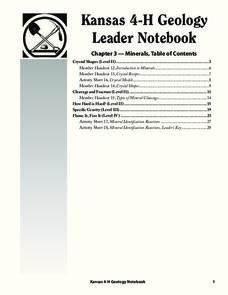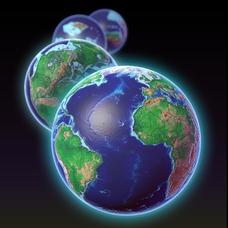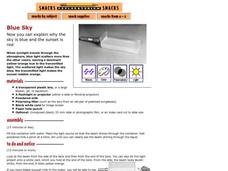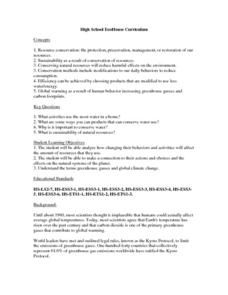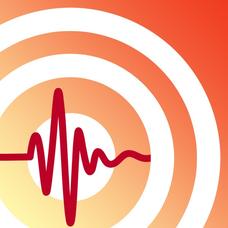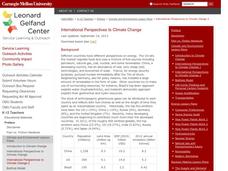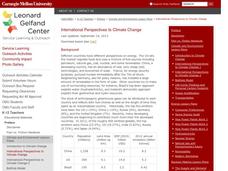Teach Engineering
Communicating Your Results
Groups analyze and interpret their data from previous research in order to develop individualized findings. The teams then use guidelines to help determine what aspects of their research to include on a poster. Class members then compare...
K-State Research and Extensions
Field Trip Preparations
Scholars prepare for a field trip to collect rock specimens. They learn how to build proper display boxes, create road logs, and study various geology careers. This is the final chapter in a seven-chapter unit on geology and contains six...
K-State Research and Extensions
You Ol’ Fossil
Geologists are gneiss, tuff, and a little bit wacke. The fifth chapter of seven includes ten activities at four different levels. The hands-on activities cover fossils including how they are formed, vertebrates, invertebrates,...
K-State Research and Extensions
Size It Up
The three types of rock aren't classic, punk, and hard. The chapter covers everything scholars need to know about rocks. Pupils compare rocks, learn about their formation, see how rocks change, and follow every step of the rock cycle....
K-State Research and Extensions
Peanut Butter Geology
Why are there old dinosaur bones in the museum? Because they can't afford new ones! The chapter contains seven hands-on activities at four different levels covering geological eras, dinosaurs, timelines, and statigraphy.
K-State Research and Extensions
The Crusty Earth
Geology rocks — literally! A geology chapter offers eleven activities at four different levels. Scholars enjoy completing hands-on experiments before applying critical thinking skills following a share, process, generalize, apply, and...
Chemical Education Foundation
Teacher's Guide to Science Projects
Do you find the idea of having a science fair with all of your learners intimidating? Use a guide that provides everything you need to know to make project-based learning manageable. The resource includes options for four different types...
K-State Research and Extensions
Water
How are maps like fish? They both have scales. The chapter includes six different activities at three different levels. Scholars complete activities using natural resources, learn how to read a map, see how to make a compass rosette,...
K-State Research and Extensions
Crystal Shapes
Of quartz I love geology! The chapter offers five activities at three different levels. It features hands-on activities that cover crystal shapes, cleavage and fracture, hardness scale, specific gravity, and mineral identification....
It's About Time
Renewable Energy Sources - Solar and Wind
There has been a huge solar energy spill! Let's go outside to play in it. This lesson includes multiple experiments showcasing solar and wind energies. Scholars build a solar heater and an anemometer before testing the results. The...
Howard Hughes Medical Institute
EarthViewer
Can you imagine Washington DC and London as close neighbors occupying the same continent? Learners will be fascinated as they step back in time and discover the evolution of the earth's continents and oceans from 4.5 billion years ago to...
TED-Ed
The Colossal Consequences of Supervolcanoes
The threat posed by super volcanoes is explored in a short video that reviews the destruction caused by Mount Tambora in 1815 and by Peru's Huaynaputina in 1600. Think it can't happen again? The narrator contends that the explosive...
Exploratorium
Resonant Rings
Physical or earth scientists construct this clever contraption to demonstrate how size effects frequency. Several paper rings of various sizes are taped onto a board and shaken to create vibrations. The resonant frequencies are easily...
Exploratorium
Blue Sky
Use a container full of water as a prism and show that as light is bent, the individual colors from different wavelengths become visible. This explains why the sky appears to be blue midday, and why as the sun nears the horizon, it looks...
Curated OER
High School EcoHouse Curriculum
How has the level of carbon dioxide changed over recent years, and what is contributing it? Groups work together to research and present their findings in a creative way. Also built into the lesson is a visit to a sustainable house, but...
University of Wisconsin
Measuring Slope for Rain Gardens
The slope of the land is an important feature when considering the erosion that will occur. In this resource, which is part of a rain garden unit, learners calculate the slope of the proposed garden site. Even if you are not planning a...
PBS
Lessons - Feeling Hot, Hot, Hot!
Volcanoes are among the most spectacular geological features on the planet. Jump into an exploration of these amazing phenomenon with this multimedia lesson series. Working collaboratively in small groups, young scientists view videos...
Environmental Protection Agency (EPA)
How Much Water Do You Use?
Incorporate reading strategies, math, research, and the scientific method into one lesson about water conservation. After reading a story about a landlady trying to determine how many people are living in an apartment, learners develop a...
US Environmental Protection Agency
Sea Level: On the Rise
With the global temperature on the rise, the effects of climate change are starting to be seen. However, many people have a difficult time conceptualizing the long-term effects, such as sea levels rising. Given an easy and effective...
US Environmental Protection Agency
Carbon Through the Seasons
Meteorologists view an animated video by the Environmental Protection Agency to learn how the carbon cycle works, and then move into groups to analyze and graph actual data of the atmospheric carbon dioxide concentration from Hawaii's...
Artisan Global
QuakeFeed Earthquake Map, Alerts and News
Amateur seismologists explore Earth's earthquakes in real time using a variety of map styles and parameter selections.
Scholastic
Science Method Printables
Six color posters are included, one for each step of the scientific method. Each step in the process is named, and three points to remember or questions to ask are also included to stimulate thinking.
Carnegie Mellon University
International Perspectives to Climate Change 2
A couple PowerPoint presentations are used to stimulate discussion about the perspectives of different countries on the issue of energy consumption. Afterward, they play a game in which each team is assigned a country, considers its...
Carnegie Mellon University
International Perspectives to Climate Change 1
After a lecture about how the first industrial revolution triggered the path to climate change, your environmental studies class discusses what the impacts are. In a culminating activity, they get into groups and identify countries on a...










